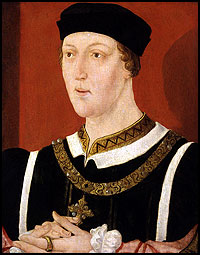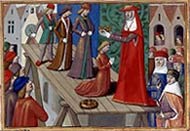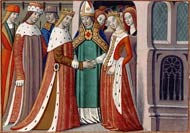


HENRY VI, King of England, son of King Henry V and Catherine of Valois, was born atWindsor on the 6th of December 1421. He became King of England on the 1st of September 1422, and a few weeks later, on the death of his grandfather Charles VI, was proclaimed king of France also. Henry V had directed that Richard Beauchamp, Earl of Warwick, should be his son's preceptor; Warwick took up his charge in 1428; he trained his pupil to be a good man and refined gentleman, but he could not teach him kingship. As early as 1423 the baby king was made to appear at public functions and take his place in parliament. He was knighted by his uncle Bedford at Leicester in May 1426, and on the 6th of November 1429 was crowned at Westminster.
 Early in the next year he was taken over to France, and after long delay crowned in Paris on the 26th of December 1431. His return to London on the 14th of February 1432 was celebrated with a great pageant devised by Lydgate. During these early years Bedford ruled France wisely and at first with success, but he could not prevent the mischief which Humphrey of Gloucester caused both at home and abroad. Even in France the English lost ground steadily after the victory of Joan of Arc before Orleans in 1429. The climax came with the death of Bedford, and defection of Philip of Burgundy in 1435. This closed the first phase of Henry's reign.
Early in the next year he was taken over to France, and after long delay crowned in Paris on the 26th of December 1431. His return to London on the 14th of February 1432 was celebrated with a great pageant devised by Lydgate. During these early years Bedford ruled France wisely and at first with success, but he could not prevent the mischief which Humphrey of Gloucester caused both at home and abroad. Even in France the English lost ground steadily after the victory of Joan of Arc before Orleans in 1429. The climax came with the death of Bedford, and defection of Philip of Burgundy in 1435. This closed the first phase of Henry's reign.
There followed fifteen years of vain struggle in France, and growing disorder at home [cf.Hundred Years' War]. The determining factor in politics was the conduct of the war. Cardinal Beaufort, and after him Suffolk, sought by working for peace to secure at least Guienne and Normandy. Gloucester courted popularity by opposing them throughout; with him was Richard of York, who stood next in succession to the crown. Beaufort controlled the council, and it was under his guidance that the king began to take part in the government. Thus it was natural that as Henry grew to manhood he seconded heartily the peace policy. That policy was wise, but national pride made it unpopular and difficult. Henry himself had not the strength or knowledge to direct it, and was unfortunate in his advisers. The cardinal was old, his nephews John and Edmund Beaufort were incompetent, Suffolk, though a man of noble character, was tactless. Suffolk, however, achieved a great success by negotiating the marriage of Henry to Margaret of Anjouin 1445. Humphrey of Gloucester and Cardinal Beaufortboth died early in 1447. Suffolk was now all-powerful in the favour of the king and queen [Margaret of Anjou]. But his home administration was unpopular, whilst the incapacity of Edmund Beaufort ended in the loss of all Normandy and Guienne.
Suffolk, however, achieved a great success by negotiating the marriage of Henry to Margaret of Anjouin 1445. Humphrey of Gloucester and Cardinal Beaufortboth died early in 1447. Suffolk was now all-powerful in the favour of the king and queen [Margaret of Anjou]. But his home administration was unpopular, whilst the incapacity of Edmund Beaufort ended in the loss of all Normandy and Guienne.
Suffolk's fall in 1450 left Richard of York the foremost man in England. Henry's reign then entered on its last phase of dynastic struggle. Cade's rebellion suggested first that popular discontent might result in a change of rulers. But York, as heir to the throne, could abide his time. The situation was altered by the mental derangement of the king, and the birth of his son in 1453. York after a struggle secured the protectorship, and for the next year ruled England. Then Henry was restored to sanity, and the queen and Edmund Beaufort, now Duke of Somerset, to power. Open war followed, with the defeat and death of Somerset at St Albans on the 22nd of May 1455. Nevertheless a hollow peace was patched up, which continued during four years with lack of all governance. In 1459 war broke out again. On the 10th of July 1460, Henry was taken prisoner at Northampton, and forced to acknowledge York as heir, to the exclusion of his own son.
Richard of York's death at Wakefield (Dec. 31, 1460), and the queen's victory at St Albans (Feb. 17, 1461), brought Henry his freedom and no more. Edward of York had himself proclaimed king, and by his decisive victory at Towton on the 29th of March, put an end to Henry's reign. For over three years Henry was a fugitive in Scotland. He returned to take part in an abortive rising in 1464. A year later he was captured in the north, and brought a prisoner to the Tower. For six months in 1470-1471 he emerged to hold a shadowy kingship as Warwick's puppet. Edward's final victory at Tewkesbury was followed by Henry's death on the 21st of May 1471, certainly by violence, perhaps at the hands of Richard of Gloucester (later King Richard III).
Henry was the most hapless of monarchs. He was so honest and well-meaning that he might have made a good ruler in quiet times. But he was crushed by the burden of his inheritance. He had not the genius to find a way out of the French entanglement or the skill to steer a constitutional monarchy between rival factions. So the system and policy, which were the creations of Henry IV and Henry V, led under Henry VI to the ruin of their dynasty. Henry's very virtues added to his difficulties. He was so trusting that any one could influence him, so faithful that he would not give up a minister who had become impossible. Thus even in the middle period he had no real control of the government. In his latter years he was mentally too weak for independent action. At his best he was a " good and gentle creature," but too kindly and generous to rule others. Religious observances and study were his chief occupations. His piety was genuine; simple and pure, he was shocked at any suggestion of impropriety, but his rebuke was only "Fie, for shame! forsooth ye are to blame."
For education he was really zealous. Even as a boy he was concerned for the upbringing of his half-brothers, his mother's children by Owen Tudor [cf. Edmund and Jasper Tudor]. Later, the planning of his great foundations at Eton and King's College, Cambridge, was the one thing which absorbed his interest. To both he was more than a royal founder, and the credit of the whole scheme belongs to him. The charter for Eton was granted on the 11th of October 1440, and that for King's College in the following February. Henry himself laid the foundation-stones of both buildings. He frequently visited Cambridge to superintend the progress of the work. When at Windsor he loved to send for the boys from his school and give them good advice.
Henry's only son was Edward, Prince of Wales (1453-1471), who, having shared the many journeys and varying fortunes of his mother, Margaret, was killed after the battle of Tewkesbury(May 4, 1471) by some noblemen in attendance on Edward IV.
(C. L. Kingsford)
 Early in the next year he was taken over to France, and after long delay crowned in Paris on the 26th of December 1431. His return to London on the 14th of February 1432 was celebrated with a great pageant devised by Lydgate. During these early years Bedford ruled France wisely and at first with success, but he could not prevent the mischief which Humphrey of Gloucester caused both at home and abroad. Even in France the English lost ground steadily after the victory of Joan of Arc before Orleans in 1429. The climax came with the death of Bedford, and defection of Philip of Burgundy in 1435. This closed the first phase of Henry's reign.
Early in the next year he was taken over to France, and after long delay crowned in Paris on the 26th of December 1431. His return to London on the 14th of February 1432 was celebrated with a great pageant devised by Lydgate. During these early years Bedford ruled France wisely and at first with success, but he could not prevent the mischief which Humphrey of Gloucester caused both at home and abroad. Even in France the English lost ground steadily after the victory of Joan of Arc before Orleans in 1429. The climax came with the death of Bedford, and defection of Philip of Burgundy in 1435. This closed the first phase of Henry's reign.There followed fifteen years of vain struggle in France, and growing disorder at home [cf.Hundred Years' War]. The determining factor in politics was the conduct of the war. Cardinal Beaufort, and after him Suffolk, sought by working for peace to secure at least Guienne and Normandy. Gloucester courted popularity by opposing them throughout; with him was Richard of York, who stood next in succession to the crown. Beaufort controlled the council, and it was under his guidance that the king began to take part in the government. Thus it was natural that as Henry grew to manhood he seconded heartily the peace policy. That policy was wise, but national pride made it unpopular and difficult. Henry himself had not the strength or knowledge to direct it, and was unfortunate in his advisers. The cardinal was old, his nephews John and Edmund Beaufort were incompetent, Suffolk, though a man of noble character, was tactless.
 Suffolk, however, achieved a great success by negotiating the marriage of Henry to Margaret of Anjouin 1445. Humphrey of Gloucester and Cardinal Beaufortboth died early in 1447. Suffolk was now all-powerful in the favour of the king and queen [Margaret of Anjou]. But his home administration was unpopular, whilst the incapacity of Edmund Beaufort ended in the loss of all Normandy and Guienne.
Suffolk, however, achieved a great success by negotiating the marriage of Henry to Margaret of Anjouin 1445. Humphrey of Gloucester and Cardinal Beaufortboth died early in 1447. Suffolk was now all-powerful in the favour of the king and queen [Margaret of Anjou]. But his home administration was unpopular, whilst the incapacity of Edmund Beaufort ended in the loss of all Normandy and Guienne.Suffolk's fall in 1450 left Richard of York the foremost man in England. Henry's reign then entered on its last phase of dynastic struggle. Cade's rebellion suggested first that popular discontent might result in a change of rulers. But York, as heir to the throne, could abide his time. The situation was altered by the mental derangement of the king, and the birth of his son in 1453. York after a struggle secured the protectorship, and for the next year ruled England. Then Henry was restored to sanity, and the queen and Edmund Beaufort, now Duke of Somerset, to power. Open war followed, with the defeat and death of Somerset at St Albans on the 22nd of May 1455. Nevertheless a hollow peace was patched up, which continued during four years with lack of all governance. In 1459 war broke out again. On the 10th of July 1460, Henry was taken prisoner at Northampton, and forced to acknowledge York as heir, to the exclusion of his own son.
Richard of York's death at Wakefield (Dec. 31, 1460), and the queen's victory at St Albans (Feb. 17, 1461), brought Henry his freedom and no more. Edward of York had himself proclaimed king, and by his decisive victory at Towton on the 29th of March, put an end to Henry's reign. For over three years Henry was a fugitive in Scotland. He returned to take part in an abortive rising in 1464. A year later he was captured in the north, and brought a prisoner to the Tower. For six months in 1470-1471 he emerged to hold a shadowy kingship as Warwick's puppet. Edward's final victory at Tewkesbury was followed by Henry's death on the 21st of May 1471, certainly by violence, perhaps at the hands of Richard of Gloucester (later King Richard III).
Henry was the most hapless of monarchs. He was so honest and well-meaning that he might have made a good ruler in quiet times. But he was crushed by the burden of his inheritance. He had not the genius to find a way out of the French entanglement or the skill to steer a constitutional monarchy between rival factions. So the system and policy, which were the creations of Henry IV and Henry V, led under Henry VI to the ruin of their dynasty. Henry's very virtues added to his difficulties. He was so trusting that any one could influence him, so faithful that he would not give up a minister who had become impossible. Thus even in the middle period he had no real control of the government. In his latter years he was mentally too weak for independent action. At his best he was a " good and gentle creature," but too kindly and generous to rule others. Religious observances and study were his chief occupations. His piety was genuine; simple and pure, he was shocked at any suggestion of impropriety, but his rebuke was only "Fie, for shame! forsooth ye are to blame."
For education he was really zealous. Even as a boy he was concerned for the upbringing of his half-brothers, his mother's children by Owen Tudor [cf. Edmund and Jasper Tudor]. Later, the planning of his great foundations at Eton and King's College, Cambridge, was the one thing which absorbed his interest. To both he was more than a royal founder, and the credit of the whole scheme belongs to him. The charter for Eton was granted on the 11th of October 1440, and that for King's College in the following February. Henry himself laid the foundation-stones of both buildings. He frequently visited Cambridge to superintend the progress of the work. When at Windsor he loved to send for the boys from his school and give them good advice.
Henry's only son was Edward, Prince of Wales (1453-1471), who, having shared the many journeys and varying fortunes of his mother, Margaret, was killed after the battle of Tewkesbury(May 4, 1471) by some noblemen in attendance on Edward IV.
(C. L. Kingsford)
Excerpted from:
Encyclopedia Britannica, 11th Ed. Vol XIII.
Cambridge: Cambridge University Press, 1910. 286.
No comments:
Post a Comment